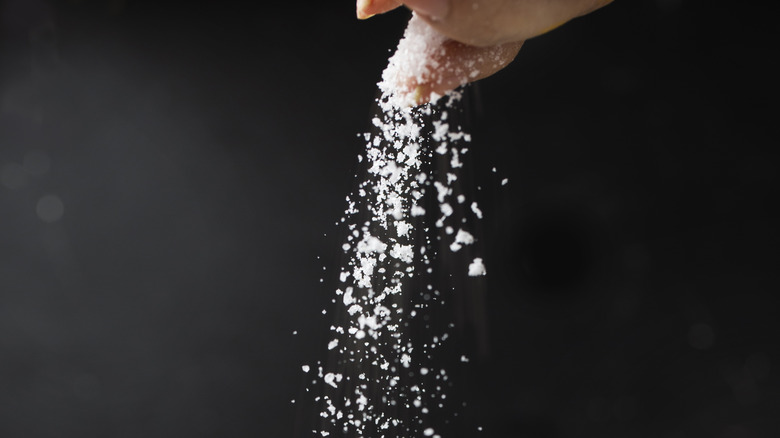Carla Hall's Tip That'll Get You Restaurant-Quality Food At Home
Cookbook author, former "Top Chef" contestant, and one of America's favorite celebrity chefs, Carla Hall has been cooking professionally for more than two decades. As a result, she's full of pearls of wisdom on everything from how a marshmallow can keep your brown sugar soft to how to unstick perfect fried chicken from a hot pan. Hall recently shared these cooking tips and more with Redbook, and her advice on creating restaurant-quality food at home is highlight-worthy.
Have you ever wondered why everything just tastes better when dining out? Even simple dishes like eggs, salads, soups, and veggies outshine home-cooked fare when they come out of a professional kitchen. According to Hall, the reason for this is not only simple, but super implementable when cooking at home. The secret? Salt as you go.
We're all familiar with the concept of seasoning to taste when a dish is near completion. But if what we taste is seriously bland, we're likely to overcorrect with large doses of salt, pepper, and spice right at the very end. The trick is to season your dish throughout the cooking process and season to taste each component of your dish (at least when feasible).
Hall uses a large stock pot of soup as an example. If you're making a big batch for a big crowd, start with a little less than a teaspoon of salt when you add your alliums and veggies. You'll then also want to add salt when you dilute the mixture with stock or broth. By the time your soup is ready you'll likely have added two whole teaspoons of salt, and that's a conservative estimate.
Salting early and often creates restaurant-quality food
Adding salt right before you serve a dish certainly helps bring out the flavors of your food and provides a quick spark to your palate. But there are reasons to salt as you go that are backed up by science. As Carla Hall notes, you create more flavor by allowing salt to work its way into the fiber of the ingredients you're using, and that takes more time than a last-minute pinch of seasoning.
As an example, chefs salt their vegetables, meats, and starches as each ingredient cooks, whether in boiling water or on a broiling pan. That's why plain green beans and other veggies just seem to taste so much better when delivered by a server on a white plate.
Even raw veggies benefit from salt. Chefs will salt salad greens before adding any other dressing or toppings. Salt makes lettuce taste more crisp and helps reduce any residual moisture on the leaves, which in turn helps prevent an overly wet dressing or soggy greens.
Eggs are another instance where salting early comes in handy. Some chefs recommend salting your egg mixture before cooking or scrambling as it helps break down the egg's protein structure and creates a more tender final product. So, stock up your pantry with table salt, sea salt, and kosher salt — and stay salty, friends.

